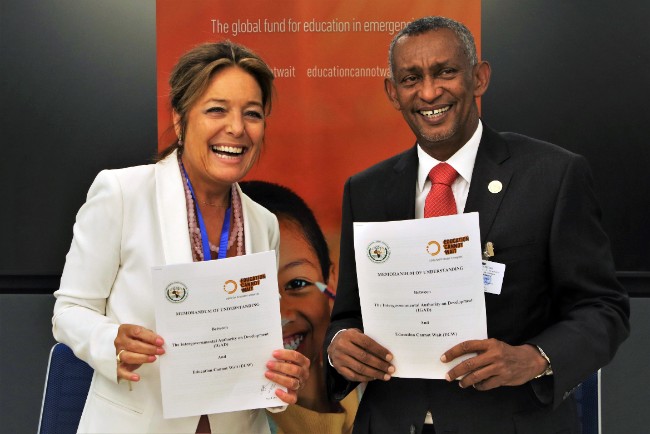New partnership to support war victims in East Africa

From left: Education Cannot Wait Director Yasmine Sherif.and IGAD Executive Secretary Amb. Mahboub M. Maalim
Education Cannot Wait (ECW) and the Intergovernmental Authority on Development (IGAD) signed a partnership agreement today on the sidelines of the United Nations (UN) General Assembly to enhance regional cooperation and accelerate more effective education investments for refugees and displaced children and youth across the eight countries of the IGAD region.
The first-of-its-kind, this agreement provides a regional work approach across the eight members states of IGAD – Djibouti, Eritrea, Ethiopia, Kenya, Somalia, South Sudan, Sudan and Uganda – a region where there are approximately 7.5 million refugees and internally displaced persons.
“No child can be left behind as we ramp up efforts to achieve the Sustainable Development Goals. Through education – and partnerships like this – we can break the cycle of exclusion and vulnerability that comes with forced displacement and has often derailed and delayed social, economic and human development in the region,” said IGAD Executive Secretary Amb. Mahboub M. Maalim.
The partnership will promote access to education for refugees, returnees and internally displaced children and youth, as agreed in the Djibouti Declaration and the Addis Ababa Call for Action. It will support IGAD member states in increasing global, regional and country-level cooperation to achieve Sustainable Development Goal 4 for universal quality education (SDG4) as part of the implementation of the UN’s Comprehensive Refugee Response Framework (CRRF).
“The IGAD region is one of the most affected by forced displacement in the world. In such a context, a regional approach is crucial for addressing education needs of uprooted children and youth in a comprehensive and sustainable manner across borders,” said Yasmine Sherif, Director of Education Cannot Wait. “Together with IGAD and our partners in the region who are responding to displacement – including governments, UN agencies, philanthropic and private sector actors and civil society – we will scale up our investments and support their efforts to achieve inclusive and equitable quality education for every child.”
The new ECW – IGAD partnership is designed to inspire more political commitment and financial resources for educational responses in the region, and to strengthen joint advocacy and capacity development. It builds on the successful model of the Education Response Plan for Refugees and Host Communities developed by the Government of Uganda jointly with humanitarian and development aid partners with ECW’s support.
At this year’s UN General Assembly, world leaders are taking stock of progress toward the Sustainable Development Goals. Despite the considerable progress on education access and participation over the past years, 262 million children and youth aged 6 to 17 were still out of school in 2017. In all 75 million children and youth in crisis-affected countries don’t have access to a quality education.
Education Cannot Wait is scaling up education-in-emergencies responses across the world and has already reached over 1.5 million children and youth. A number of crisis-affected and forcibly displaced children and youth in IGAD Member States already benefit from ECW investments, including Ethiopia, Somalia and Uganda, with planned multi-year responses under development for South Sudan and Sudan.
The Uganda Model
Last year Education Cannot Wait worked with the Government of Uganda, humanitarian and development aid organizations, civil society and other partners to develop Uganda’s ground-breaking Education Response Plan for Refugees and Host Communities. ECW contributed US$11 million in seed funding to support the launch of the plan, which seeks to mobilize a total of US$389 million to reach more than 560,000 refugee and host community children and youth in the country. Additional ECW funding is planned over the next two years.
The partnership will empower other countries in the bloc to use the lessons learned from Uganda’s education response to better meet the needs of refugee and displaced children through national education plans, refugee and/or humanitarian response plans.
ECW

